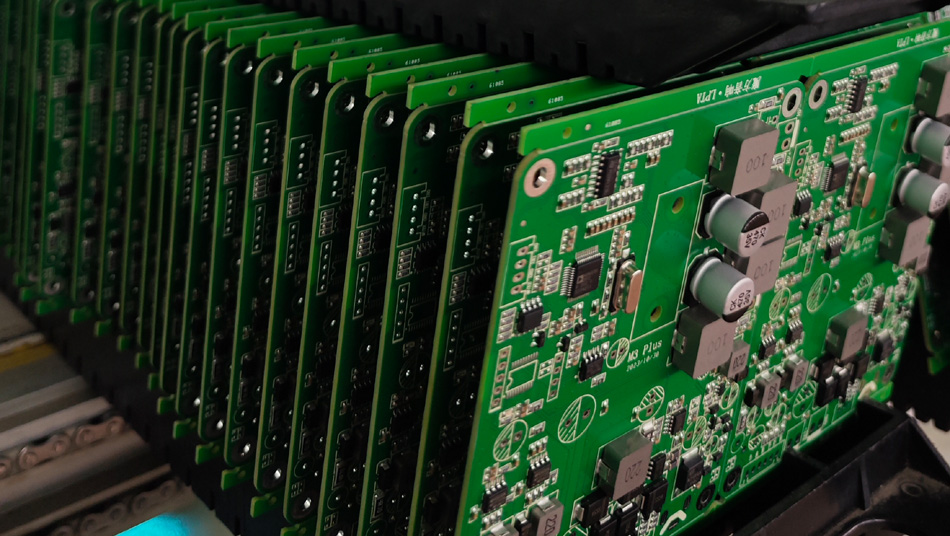- English
- Español
- Português
- русский
- Français
- 日本語
- Deutsch
- tiếng Việt
- Italiano
- Nederlands
- ภาษาไทย
- Polski
- 한국어
- Svenska
- magyar
- Malay
- বাংলা ভাষার
- Dansk
- Suomi
- हिन्दी
- Pilipino
- Türkçe
- Gaeilge
- العربية
- Indonesia
- Norsk
- تمل
- český
- ελληνικά
- український
- Javanese
- فارسی
- தமிழ்
- తెలుగు
- नेपाली
- Burmese
- български
- ລາວ
- Latine
- Қазақша
- Euskal
- Azərbaycan
- Slovenský jazyk
- Македонски
- Lietuvos
- Eesti Keel
- Română
- Slovenski
- मराठी
- Srpski језик
Deciphering the full-process quality monitoring system of PCBA factories
2025-08-09
In the PCBA processing process, quality is one of the factors that customers care about most. Ensuring high product quality not only helps to improve customer satisfaction, but also reduces the cost of rework and repair. To this end, many PCBA factories have introduced a full-process quality monitoring system to strictly control every stage of production. This article will analyze in detail the key elements of the full-process quality monitoring system in PCBA factories and explain how it ensures product quality.

1. What is a full-process quality monitoring system?
Definition and function
The full-process quality monitoring system is a system that integrates multiple monitoring, evaluation and feedback mechanisms to control every link in PCBA processing. This system covers the full-process monitoring from raw material inspection, production process control to finished product inspection to ensure that each step meets the predetermined quality standards.
Why is it important?
Each step in PCBA processing may have an impact on the performance of the final product. The full-process quality monitoring system uses strict standards to promptly detect and correct any deviations, minimize the generation of defective products, and thus improve production efficiency and product quality.
2. Key links in quality control
Raw material inspection
The first step in PCBA processing is to conduct quality inspection on the raw materials used. This includes circuit board substrates, components, solder, etc. By carefully testing and screening these materials, the factory can avoid using materials that do not meet the requirements and control quality risks from the source.
Quality control in the production process
During the production process, various manufacturing equipment, soldering processes and assembly steps are strictly monitored. The full-process quality monitoring system monitors the quality of solder joints, the accuracy of components and the consistency of assembly through automated testing equipment and real-time data analysis. Once any abnormality is found, the system will immediately issue an alarm and take corrective measures quickly to avoid the spread of the problem.
Finished product inspection
The final stage of PCBA processing is to conduct comprehensive functional testing and reliability testing on the finished product. This usually includes electrical testing, functional testing, and environmental stress testing. Through this link, the factory can ensure that each finished product meets customer requirements and has good stability and durability.
3. Application of automation and intelligence in quality control
Automated testing equipment
As PCBA factories gradually move towards intelligent manufacturing, more and more factories have introduced automated testing equipment. These devices can quickly and accurately detect defects in production, such as poor soldering and component misalignment. Compared with traditional manual inspection, automated equipment has higher efficiency and accuracy.
Big data and real-time analysis
The application of big data analysis technology in PCBA processing is also becoming more and more widespread. By collecting and analyzing data in the production process, the factory can monitor every detail on the production line in real time, predict possible quality problems, and adjust production parameters in time. This preventive monitoring greatly improves the effect of quality control and reduces the production of defective products.
4. How does the quality monitoring system improve the quality of PCBA processing
Improve product consistency
Through the full-process quality monitoring system, PCBA factories can ensure that each batch of products meets the same quality standards. This helps to improve product consistency and reduce product failures caused by individual defects.
Reduce rework and repair costs
The timely feedback function of the quality monitoring system can intervene in the early stages of the problem, thereby avoiding large-scale product rework. This not only reduces the operating costs of the factory, but also improves customer satisfaction.
Enhance customer trust
When customers know that the PCBA factory uses an advanced full-process quality monitoring system, they will have more confidence in the quality of the products delivered by the factory. This helps to establish long-term partnerships and increase customer loyalty.
5. Continuous improvement: the future development of quality monitoring systems
Popularization of intelligent monitoring systems
With the development of artificial intelligence and Internet of Things technologies, future PCBA factories will increasingly rely on intelligent quality monitoring systems. These systems will be able to automatically learn and adapt to changes in production, continuously optimize production processes, and improve production efficiency and quality control levels.
From passive to active quality management
Future quality monitoring systems will shift from traditional passive monitoring to active prediction and prevention. This change will make quality control in the PCBA processing process more accurate and effective, and further reduce the occurrence of product defects.
Conclusion
The full-process quality monitoring system in PCBA processing is an important tool to ensure product quality. By strictly controlling every link from raw material inspection to finished product inspection, and combining automation and intelligent technology, PCBA factories can effectively improve production efficiency, reduce rework rates and enhance customer trust. In the future, with the continuous advancement of technology, quality monitoring systems will become more intelligent, bringing more innovation and change to the PCBA processing industry.
-
Delivery Service






-
Payment Options









